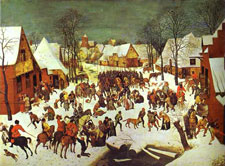One of the most cherished carols of the Christmas season is often presented as a melody without lyrics. For this reason, the tune is familiar, but the words of the carol are not. The carol of which I am referring to is known as the Coventry Carol, which originates in a 16th century “mystery play” called the Pageant of the Shearman and Tailors. The play and the song concern the massacre of the young children of Bethlehem at the command of King Herod, a story that is recorded in the Gospel of Matthew. The Coventry Carol is a lament that is imagined in the play to have been sung by the mothers whose children have been murdered by Herod’s cruelty; it combines the sound of their weeping with the gentle cadences of a lullaby:
Lullay thou little tiny child,
By, by lully lullay.
O sisters, too how may we do,
For to preserve this day;
This poor youngling for whom we sing,
By by lully lullay.
Herod the king, in his raging
Charged he hath this day;
His men of might in his own sight
All young children to slay.
Then woe is me, poor child for thee
And ever mourn and say;
For thy parting, no say nor sing
By by lully lullay
Historically, Herod was well known for his cruelty. He was believed to have engineered the death of a Hasmonean prince who threatened his hold on power and had at least one of his wives and her mother executed. Fearing the schemes of his own sons who were conniving to usurp his claim on the throne, he had them executed as well. Caesar Augustus, who was no stranger himself to murder and intrigue, was said to have commented that, “I would rather be Herod’s dog than his son.” We might react in disgust to all of this, but the world into which Christ was born was for the most part controlled by people like Herod- he was not an exception, but the rule.
The Gospel of Matthew is the only existing historical reference that mentions the massacre of the children of Bethlehem. It seems to have passed under the radar of historical concerns. This is not difficult to understand when we consider that the common people of Bethlehem did notmerit much attention at all in a world controlled by the likes of Herod or Caesar. As such, their indignities and sufferings would not matter all that much to the historians of the time. Matthew tells us that Herod was seized by fear at rumors of a child born in Bethlehem that was the promised Messiah. If these rumors were true, such a revelation meant the end of Herod and his dynasty. Unable to discover the identity of this child, he ordered all the young children in the region around Bethlehem to be killed. We would probably rather not have the memory of such a terrible event interrupt our feelings of Christmas cheer, but the Church insists that we look at the total event of Christ’s coming into the world, and the death of these innocent children is not an incidental part of the story of the Incarnation.
Shadows lurked beneath the light of the star of Bethlehem.
Sister Wendy Becket, in one of her reflections, begs us to consider the disturbing irony in all this. The Lord Jesus, who is to end his life by dying for others, begins his life with others dying because of him. His safety is assured, but his own Mother’s happiness is preserved amidst the misery of others. We must always remember that the Holy Family begins their mission in exile, as refugees. The world in which they lived was not a safe or easy place. God accepting for himself a human nature made him vulnerable to all the trials and tribulations of life. Christ did this with full awareness of what it would all mean and what it would affect. He would have to accept not only the joy and glory of being human, but our sorrow and sufferings as well.
If we are looking for a spiritual lesson in all of this, it might be for us to understand that though we are overjoyed as Christians at the coming of Christ, many people do not share our sense of elation. There were many, who like Herod, greeted the coming of Christ with a sense of dread for they would have a great deal to lose when Christ was finally revealed, and as such, they will do everything in their power to resist him.
Further, cruel King Herod represents all the powers that stand against Christ. These powers are not just outside ourselves; they lurk within us all. There are parts of ourselves that want nothing to do with Christ and jealously guard their independence from any incursion of his will. The Gospel of John reminds us of this truth in the proclamation that the Lord “came to what was his own, but his own did not accept him.” This is not meant simply as a reference to those, who like Herod, refused the Lord centuries ago- it is a meant for all of us to carefully consider. What aspects of our own lives and the lives of others are we ready to destroy because of our refusal of Christ? The story of Herod is meant as a warning to us in this regard.
The Gospel falls silent in regards to Herod after Matthew’s account of the massacre in Bethlehem. Herod’s kingdom would be divided among the sons he despised. Within less than a hundred years after his death, his great monuments, built to proclaim his glory for thousands of years, would be reduced to ruins. History remembers him as a petty tyrant. To this day, we mourn the children of Bethlehem, but no one weeps for Herod in the wake of his passing. By attacking Christ we assure our own destruction.
